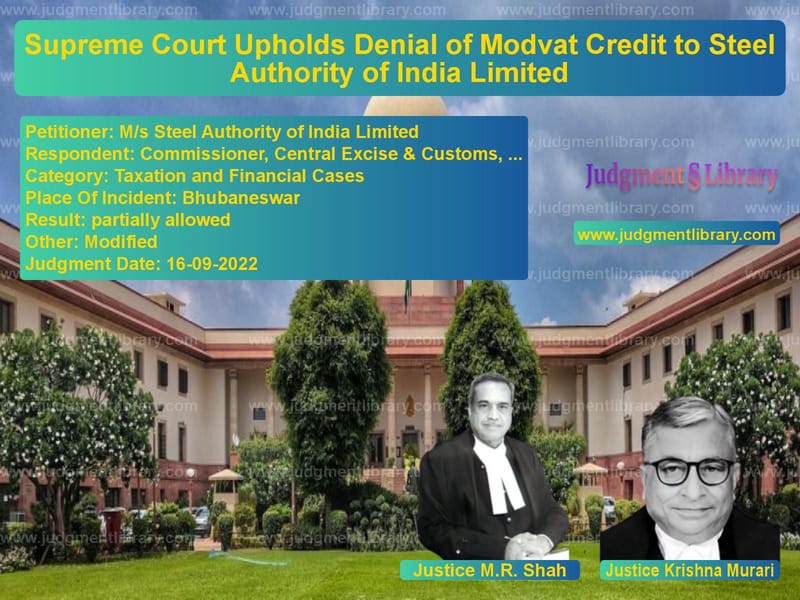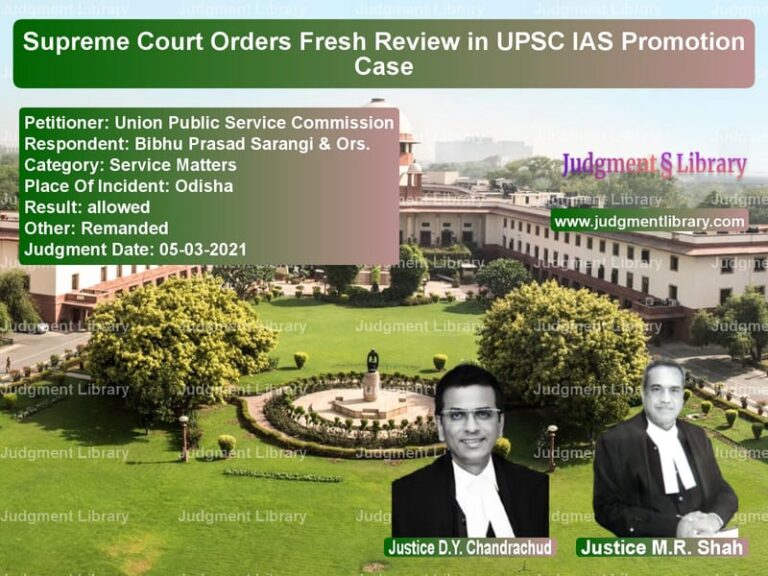Supreme Court Upholds Denial of Modvat Credit to Steel Authority of India Limited
The Supreme Court of India delivered a crucial judgment in the case of M/s Steel Authority of India Limited (SAIL) vs. Commissioner, Central Excise & Customs, Bhubaneswar. The judgment addressed whether SAIL was entitled to claim Modvat credit on the purchase of ‘Guide Car’ under Rule 57Q of the Central Excise Rules, 1944. The Court upheld the decision of the Excise Tribunal, denying the credit and affirming that ‘Guide Car’ did not qualify as a ‘component’ of the Coke Oven Battery. However, the Supreme Court set aside the penalty imposed on SAIL, holding that there was no mala fide intent in the credit claim.
Background of the Case
The dispute arose from a show cause notice issued to SAIL, demanding the reversal of Modvat credit amounting to ₹3,09,78,465, which had been availed on various capital goods, including ‘Guide Car.’ The revenue authorities contended that ‘Guide Car’ was classifiable under Chapter sub-heading 8603.00 of the Central Excise Tariff Act, 1985, making it ineligible for Modvat credit. SAIL argued that ‘Guide Car’ should be classified under Chapter sub-heading 8428.90 and that it qualified as a ‘component’ of the Coke Oven Battery, thereby making it eligible for credit.
Legal Proceedings
Arguments by SAIL
- SAIL contended that ‘Guide Car’ was an essential part of the Coke Oven Battery and facilitated the transportation of hot coke, making it eligible for credit.
- The company asserted that the classification under heading 8603.00 was incorrect and should instead fall under 8428.90.
- It further argued that even if classified under 8603.00, the ‘Guide Car’ should still be eligible for Modvat credit as a component under Rule 57Q.
- SAIL also cited precedents, including Collector of Central Excise, Baroda v. Cotspun Limited, arguing that classification changes should apply prospectively and not affect prior credit claims.
Arguments by the Revenue Department
- The Revenue Department maintained that ‘Guide Car’ was classified under Chapter 86.03 at the supplier’s end, making it ineligible for Modvat credit.
- It argued that ‘Guide Car’ was a separate entity and could not be considered a component or part of the Coke Oven Battery.
- The department cited the Supreme Court ruling in Saraswati Sugar Mills v. Commissioner of Central Excise, which defined ‘components’ as integral parts of machinery that are necessary for its function.
- The Revenue Department justified the penalty, stating that SAIL wrongfully availed of credit despite knowing the classification of ‘Guide Car’.
Supreme Court’s Observations
1. Classification of ‘Guide Car’
The Supreme Court ruled that ‘Guide Car’ was correctly classified under Chapter sub-heading 8603.00 and that this classification, once established at the supplier’s end, could not be altered by the recipient.
2. Non-Eligibility for Modvat Credit
The Court held that ‘Guide Car’ was not an integral part of the Coke Oven Battery but was a distinct equipment used for transporting hot coke. The Court emphasized that to qualify as a ‘component,’ an item must be necessary for the primary function of the machinery and not merely aid in its operation.
3. Rejection of Prospective Classification Argument
The Court rejected SAIL’s argument that classification changes should apply prospectively, stating that the classification done at the consignor’s end is final and applicable from the date of supply.
4. Penalty Set Aside
While upholding the demand for reversal of Modvat credit, the Supreme Court ruled that the penalty imposed on SAIL was unjustified. The Court found no evidence of mala fide intent or willful misstatement by SAIL in claiming credit, thus setting aside the penalty.
Final Verdict
The Supreme Court ruled as follows:
- The Modvat credit of ₹45,86,664 on ‘Guide Car’ was correctly disallowed.
- The classification of ‘Guide Car’ under 8603.00 was upheld.
- The penalty of ₹1,00,000 imposed on SAIL was quashed.
- SAIL was required to reverse the claimed Modvat credit but was not liable to pay any penalty.
Impact of the Judgment
This ruling clarifies the interpretation of Rule 57Q of the Central Excise Rules, 1944, particularly regarding the definition of ‘components’ for Modvat credit eligibility. The judgment reinforces the principle that classification of goods done at the supplier’s end is binding on the recipient and that credit eligibility cannot be assumed merely based on end-use.
Read also: https://judgmentlibrary.com/income-tax-deduction-on-bad-debts-supreme-court-ruling-explained/
Conclusion
The Supreme Court’s decision in this case serves as a crucial precedent in Modvat credit disputes. It reiterates that:
- Classification of capital goods is final once determined at the supplier’s end.
- Modvat credit under Rule 57Q is available only for items that are integral components of eligible machinery.
- Penalties should not be imposed in cases where no willful misrepresentation is proven.
This judgment provides clarity for industries availing Modvat credit, ensuring that credit claims are made in accordance with established classification norms and excise laws.
Petitioner Name: M/s Steel Authority of India Limited.Respondent Name: Commissioner, Central Excise & Customs, Bhubaneswar.Judgment By: Justice M.R. Shah, Justice Krishna Murari.Place Of Incident: Bhubaneswar.Judgment Date: 16-09-2022.
Don’t miss out on the full details! Download the complete judgment in PDF format below and gain valuable insights instantly!
Download Judgment: ms-steel-authority-vs-commissioner,-centra-supreme-court-of-india-judgment-dated-16-09-2022.pdf
Directly Download Judgment: Directly download this Judgment
See all petitions in Tax Refund Disputes
See all petitions in GST Law
See all petitions in Customs and Excise
See all petitions in Judgment by Mukeshkumar Rasikbhai Shah
See all petitions in Judgment by Krishna Murari
See all petitions in partially allowed
See all petitions in Modified
See all petitions in supreme court of India judgments September 2022
See all petitions in 2022 judgments
See all posts in Taxation and Financial Cases Category
See all allowed petitions in Taxation and Financial Cases Category
See all Dismissed petitions in Taxation and Financial Cases Category
See all partially allowed petitions in Taxation and Financial Cases Category







